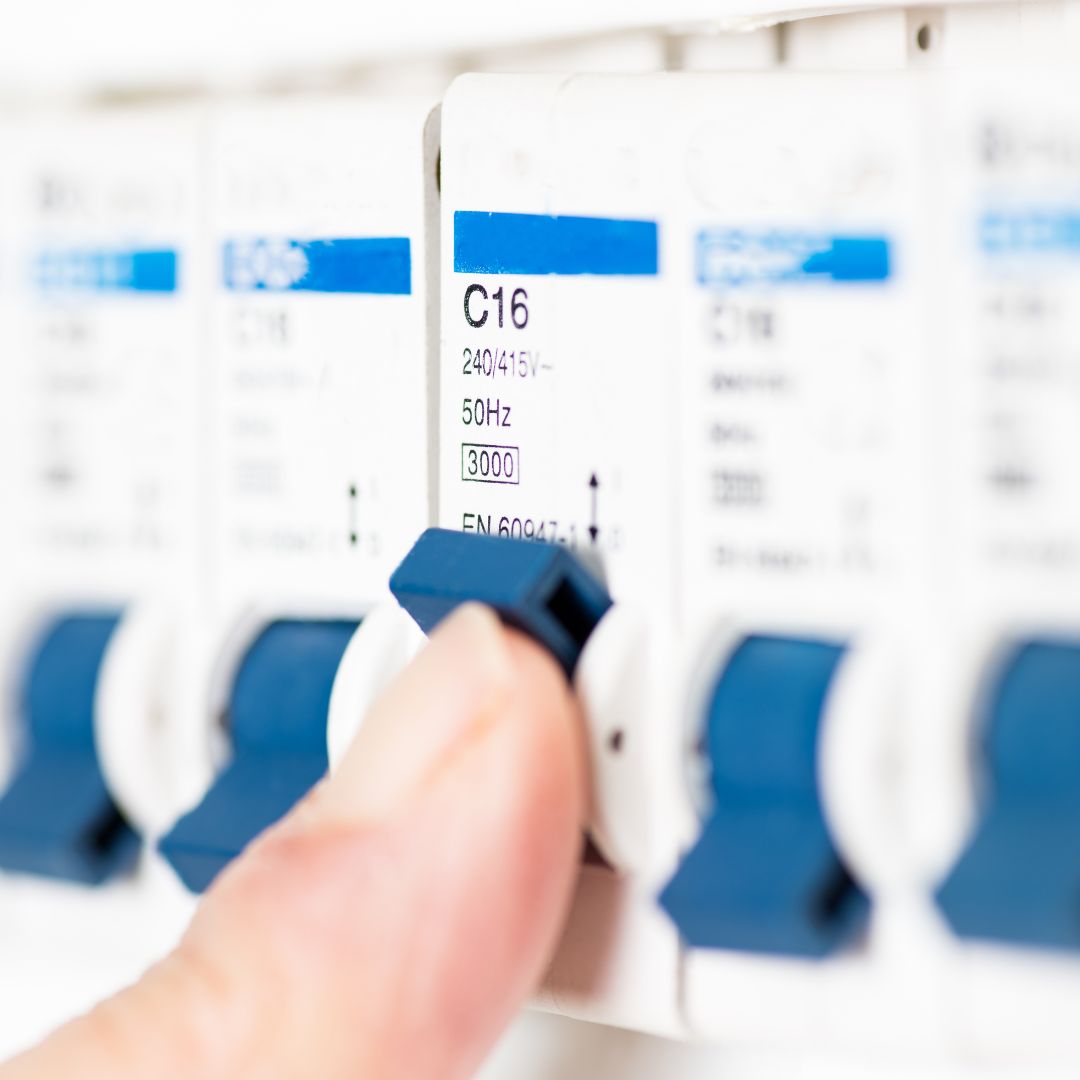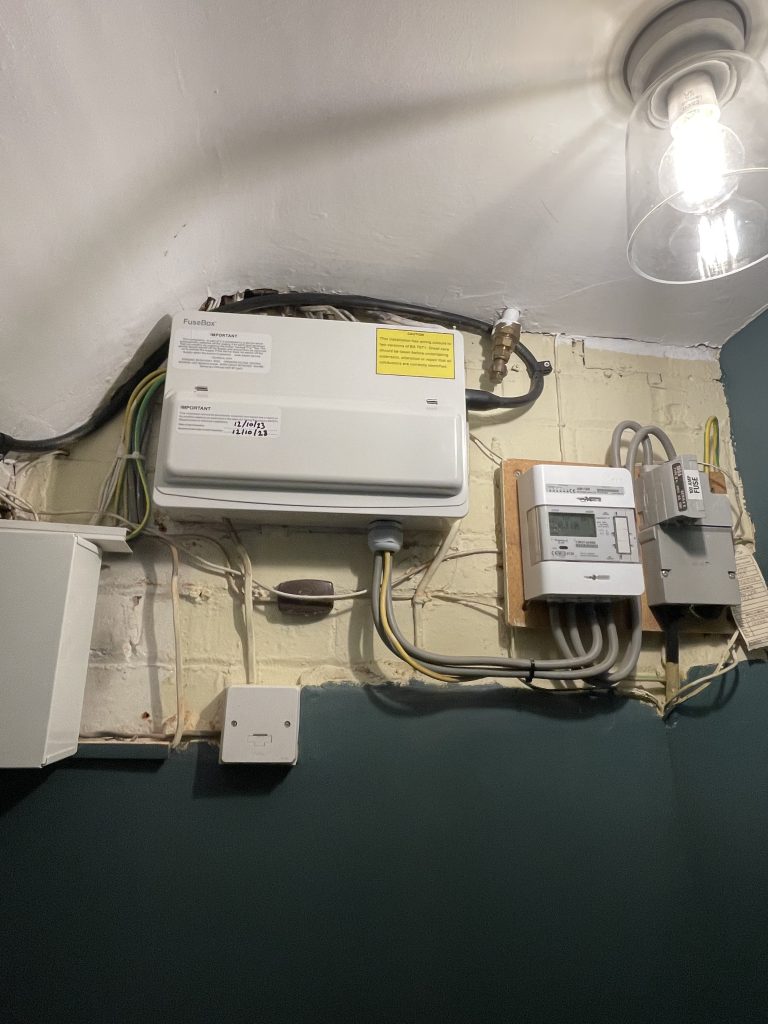Fusebox Replacement
Why a Fusebox Replacement is Important
A fusebox, or fuse board, is an essential part of any building but it is often overlooked. With modern electrical demands increasing due to the rise of technology and household gadgets, an older fusebox may no longer be able to handle all the demand.
Therefore, a fusebox change to a new modern consumer unit ensures reliability, safety, and improved energy efficiency for your home or business.

Contact
Updates to Electrical Wiring Regulations
The UK's electrical regulations, specifically BS7671, have been updated to enhance safety, requiring new consumer units to be fire-resistant. The 18th edition consumer units are user-friendly and provide enhanced protection against electrical faults.
Modern Lighting and Electrical specialises fusebox replacement in the West Midlands homes to ensure safety and compliance with latest standards. Rewireable fuses are used in many older fuseboxes instead of RCD protection, which instantly turns off power during electrical faults to prevent danger of electric shocks.
Why Should I Have a Fusebox Replacement to a Modern Consumer Unit?
- Function: They provide protection by "tripping" circuits when a fault is detected.
- Safety: Modern consumer units offer superior safety features, including protection against electric shocks and fire hazards.
- SPD : Surge Protection Device, all our fuseboards have SPD’s fitted to them. In the event of your property being struck by lightening or a big surge of power from the grid. The SPD is designed to diffuse these and protect your property and electrical items that are plugged in like your TV’s, laptops, EV Cars etc.
- Future : We install fuseboards that have multiple spare ways for future expansion of your electrical needs, from extending your property to having an Electric car.
When Should You Consider a Fusebox Replacement?
- Age: Modern electrical appliances may be too much for a fusebox that is more than 15 years old. While consumer units typically last 20 to 30 years, older versions may need an upgrade.
- Wear and Tear: Signs of wear, such as arcing, sparking, or melted fuses, indicate that it’s time for a fusebox change.
- Upgrading Electrical Systems: If you are adding new circuits, appliances, or making significant electrical upgrades, an older fusebox may not be able to handle the extra load and therefore require a fusebox replacement.
- Safety Concerns: Old-style fuse boxes with wooden backboards or cast iron switches should be replaced for safety reasons.
- Faulty Wiring: Inappropriate wiring may be indicated by flickering lights, burning smells, discoloured outlets, or small shocks when handling equipment. If necessary, an expert electrician may evaluate your system and suggest a fusebox replacement.
Types of Consumer Units
Consumer units come in various types, each designed to meet different electrical needs:
- Split Load RCD Consumer Unit: This type divides circuits into two sections, both protected by an RCD, balancing safety and cost, but posing risk of simultaneous circuit shutdown.
- Individual RCBO Consumer Unit: This is our preferred method of consumer unit; every circuit has its own dedicated RCBO providing full protection and no nuisance tripping. If there’s a fault on your shower you only loose the shower circuit till its fixed rather than multiple circuit’s throughout your property.
- Garage Consumer Unit: This unit is designed for outbuildings, garages, or sheds, with simplified circuits and an RCD for safety, and is intended for powering lighting or electrical outlets.
- Shower Consumer Unit: A shower consumer unit is a compact unit designed to handle high electrical demand in an electric shower, typically incorporating an MCB and RCD for fault protection.
- High Integrity Consumer Unit: MCBs provide high-level safety for critical circuits like lighting or security systems, ensuring individual protection without RCD tripping, making them ideal for complex installations requiring dedicated circuit protection. These fuse boards are for commercial and industrial installations only.
Factors That Affect the Cost of Fusebox Replacement
Several factors can influence the overall cost of a fusebox replacement or consumer unit replacement:
- Size of the Property: Larger homes with more electrical appliances and circuits will need a higher-capacity consumer unit, which may be more expensive.
- Type of Consumer Unit: Different types of consumer units vary in price based on their features and capacity.
- Condition of the Existing Unit: If your current fuse box is in poor condition, removing it might require additional labour, which could increase the overall cost.
- Electrical Inspection: An electrical inspection may be necessary to ensure your home’s wiring is safe. This typically costs around £160
- Additional Work: If you decide to add new sockets, lighting, or wiring during the fuse box replacement, these will add to the total cost. Electricians generally charge around £45 per hour for additional work.

Contact Us for A Fusebox Replacement Quote
A fusebox replacement with a modern consumer unit is crucial for both legal compliance and safety in your home or business. Modern consumer units are designed to protect against electrical faults, reduce fire risk, and improve efficiency. A qualified electrician can perform a fusebox change with quality and safety in mind.
Fusebox Replacement FAQs
Yes, a fusebox replacement is a complex and potentially dangerous task that must be done by a certified electrician. In Birmingham, the work must comply with UK regulations, and you'll need an installation certificate to ensure it's done safely and legally.
On average, a fusebox replacement takes around 3 to 5 hours, depending on the size of the property and the complexity of the electrical system. This includes testing to ensure everything is safe and compliant with current standards.
Fusebox typically last around 20 to 30 years. However, if your fusebox is outdated, lacks RCD protection, or struggles with modern electrical demands, it’s wise to consider a fusebox replacement sooner.
Yes, a fusebox change is notifiable under UK building regulations. The work must be reported to your local building authority or carried out by an electrician registered under a Competent Person Scheme like NICEIC, which will handle the notification for you.
In Birmingham, the cost of replacing a fuse box typically starts at £650, depending on the size of the property and any additional electrical work required. This includes the cost of the new unit, labour, and safety checks.
